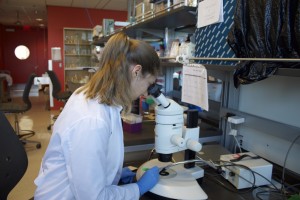What do you think about when you hear the phrase ‘genetically engineered crops’? Do you think they’re inherently bad because they’re not ‘natural’?
Well, maybe you should think twice before answering, because hybridization is a process commonly found in nature. Basically, hybridization is cross-breeding between two species with different genes. In animals it’s pretty distinct in appearance, but in plants the main changes are on a chemical level. These changes are what affects the taste, smell, or defence mechanisms of the plants. Therefore, people might find a useful application to them, as hybrids may be grown as crops with better qualities, such as stronger resistance against diseases and insects. That’s why researchers are interested in exploring the genes of various plants to find the benefits, which humanity can use.
How the mystery unveiled

Dr. Celine Caseys in her lab at UBC. Photo by Alex B.
For example, Dr Celine Caseys and her colleagues at the University of Fribourg, Switzerland, examined the hybridization process between two types of trees from the Poplar family. Their methods involved collecting poplar leaves in three European regions and then looking for certain chemicals, responsible for defending trees from insects. More details on this research in the video below.

Video: Benefits of Hybridization in plants by Henry Liu and Jan Jenko, Group 5
Practical use
The research revealed that hybrids are capable of creating better defence mechanisms by more efficiently producing chemicals against insects. This might have a practical application for productional growing of plants (like for biofuel) and, furthermore, for farming purposes, since the plants will require less pesticides, therefore growing crops will cost less. More on the benefits and potential drawbacks of hybridization in the podcast.
Audio clip: Adobe Flash Player (version 9 or above) is required to play this audio clip. Download the latest version here. You also need to have JavaScript enabled in your browser.
Podcast: Benefits and drawbacks of hybridization by Alex Budkina, Group 5
As we learned from above, studying the effects of hybridization is really important, because despite all potential benefits, there are still some danger behind the artificial modification of genes, such as endangering wild populations. Therefore, humanity must consider the “ecological consequences”, according to Dr.Caseys, of creating genetically engineered plants. We still know too little about the process, so more studies of natural hybridization will help us to unveil the mysteries behind it.
~ Group #5: Alex Budkina, Henry Liu, Jan Jenko

